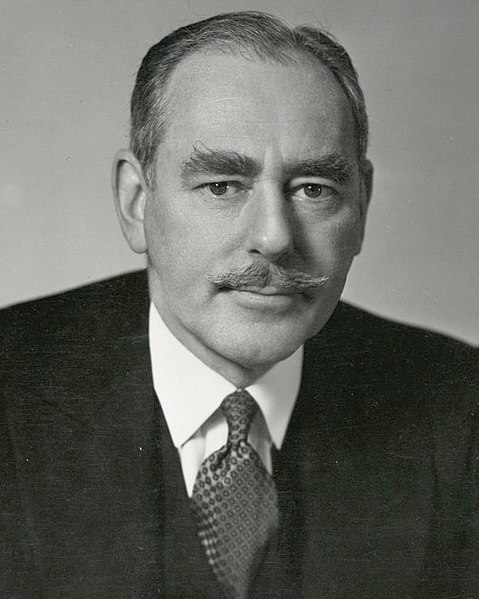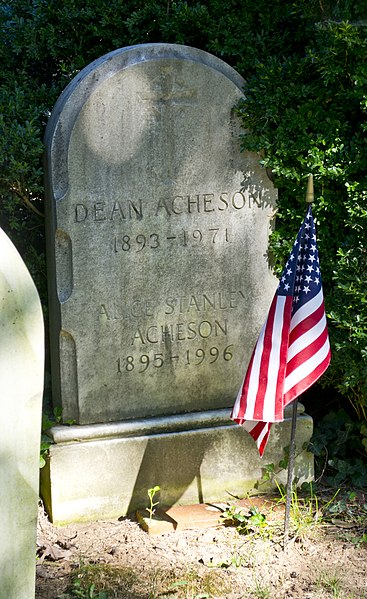Dean Gooderham Acheson was an American statesman and lawyer. As the 51st U.S. Secretary of State, he set the foreign policy of the Harry S. Truman administration from 1949 to 1953. He was also Truman's main foreign policy advisor from 1945 to 1947, especially regarding the Cold War. Acheson helped design the Truman Doctrine and the Marshall Plan, as well as the North Atlantic Treaty Organization. He was in private law practice from July 1947 to December 1948. After 1949 Acheson came under partisan political attack from Republicans led by Senator Joseph McCarthy over Truman's policy toward the People's Republic of China.
Dean Acheson
Acheson sworn into office as Secretary of State, by Chief Justice Fred M. Vinson, (January 21, 1949)
Acheson (fifth from right) as Secretary of State at a meeting of the Truman cabinet, August 25, 1950; President Truman is fourth from right
The gravesite of Dean Acheson in Oak Hill Cemetery.
Foreign policy of the Harry S. Truman administration
The main issues of the United States foreign policy during the 1945–1953 presidency of Harry S. Truman include:Final stages of World War II included the challenge of defeating Japan with minimal American casualties. Truman asked Moscow to invade from the north, and decided to drop two atomic bombs.
Post-war Reconstruction: Following the end of World War II, Truman faced the task of rebuilding Europe and Japan. He implemented the Marshall Plan to provide economic aid to Europe and Washington supervised the reconstruction of Japan.
Formation of the United Nations: Truman played a key role in the formation of the United Nations, which was established in 1945 to promote international cooperation and prevent another world war. Because of the Soviet veto, it was ineffective in most major disputes.
Cold War: Truman led the nation into the Cold War in 1947, a period of heightened tensions and rivalry between the United States and the Soviet Union. Truman helped form the NATO military alliance. He implemented the policy of containment, which aimed to stop the spread of communism and limit Soviet influence around the world.
Korean War: In 1950, North Korea invaded South Korea, leading to a bloody conflict that lasted until 1953. Truman authorized U.S. military intervention in the conflict, which led to a protracted and costly war. He rejected the advice of General Douglas MacArthur, and fired him in 1951.
Nuclear arms race: Truman made the decision to build the hydrogen bomb. He oversaw the development of the U.S. nuclear arsenal and the start of the nuclear arms race with the Soviet Union, which had far-reaching implications for U.S. foreign policy.

President Harry S. Truman directed U.S. foreign policy from 1945 to 1953. His main advisor was Dean Acheson
Alben W. Barkley
Walter Bedell Smith
Dean Acheson







